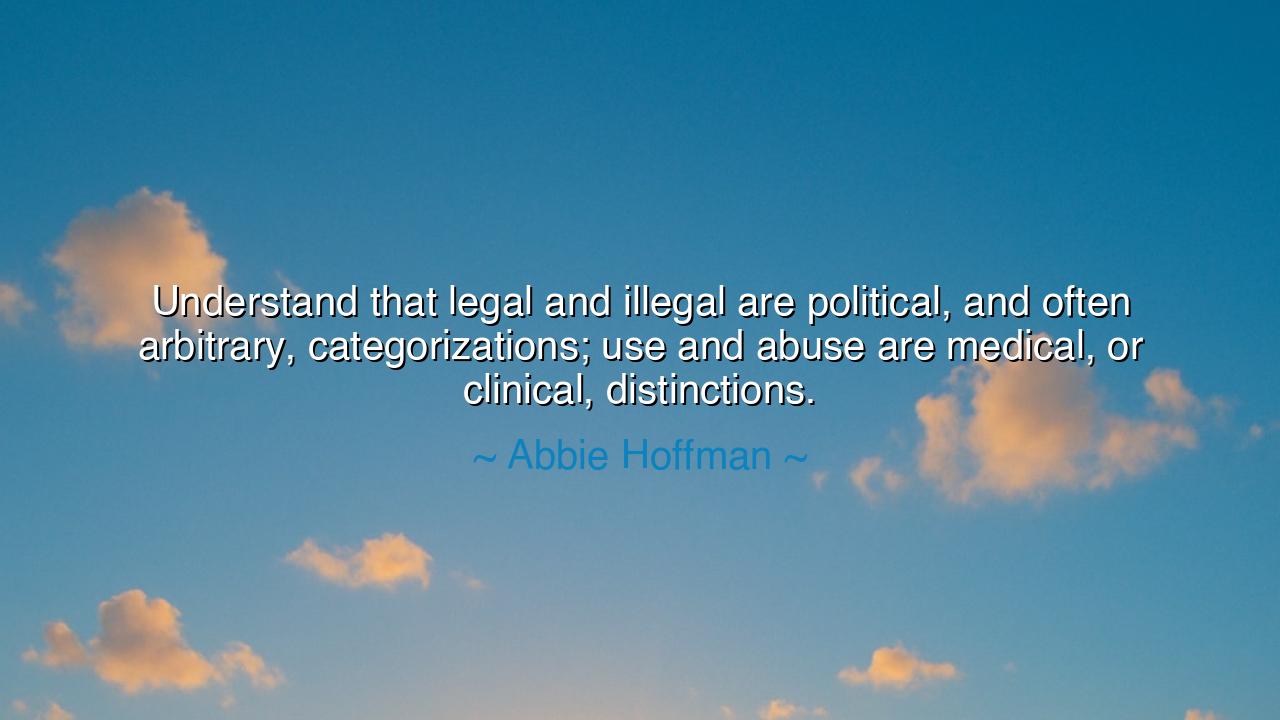
Understand that legal and illegal are political, and often
Understand that legal and illegal are political, and often arbitrary, categorizations; use and abuse are medical, or clinical, distinctions.






When Abbie Hoffman declared, “Understand that legal and illegal are political, and often arbitrary, categorizations; use and abuse are medical, or clinical, distinctions,” he invited humanity to peer beneath the veil of law and question the foundations of power itself. In these words lies a timeless observation: the line drawn by statutes is often drawn by the rulers, while the line drawn by nature — by health, by harm, by the body and mind — is far more precise. Hoffman reminds us that what is criminalized is not always inherently wrong, and what is permitted is not always virtuous; the law speaks of politics, not of human well-being.
The origin of this thought emerges from the turbulent years of the 1960s and 1970s, when Hoffman, a fiery activist and provocateur, observed the clash between government authority and individual freedom. In the struggle over drugs, civil disobedience, and cultural norms, he saw that legality often reflected convenience, power, or prejudice, rather than morality or science. A substance could be legal one day and illegal the next, not because its effects changed, but because the political winds shifted. Meanwhile, the clinical distinction of use versus abuse remained grounded in observable harm — in bodies and minds, not in statutes or decrees.
To the ancients, this distinction would have been familiar. Plato and Aristotle warned of the dangers of laws that served rulers rather than reason. The wise understood that justice must follow truth, not convenience, and that the wellbeing of the soul and body often diverged from the letter of the law. Hoffman’s observation is a modern echo of this timeless warning: that political authority and natural consequence often speak in different tongues. To understand this is to see the world clearly, unclouded by the false authority of arbitrary labels.
Consider the history of alcohol prohibition in the United States. In 1920, the Volstead Act made alcohol illegal, criminalizing its production and consumption. Yet the clinical reality of intoxication did not vanish; people still drank, still suffered the effects of overuse, and still faced harm. Law attempted to dictate morality, but could not alter human physiology. Hoffman’s words find vivid illustration here: legality was political, shifting, and often arbitrary, while abuse remained a medical truth, measurable and undeniable.
Similarly, in the world of controlled substances today, marijuana may be legal in one state and illegal in another, yet the human body recognizes only dosage, toxicity, and harm. Governments legislate in the domain of power, not the domain of physiology. Hoffman urges us to distinguish external impositions from internal realities, to see beyond the edicts of authority and consider the true consequences of action. He calls upon the wisdom of observation: measure harm, measure health, and let knowledge guide judgment, rather than blind adherence to law.
Yet there is a deeper moral teaching in Hoffman’s insight. To recognize that legality is political is not to reject law entirely, but to place it in its proper context. Citizens must question, analyze, and understand the reasons behind prohibitions and permissions. Use and abuse, however, are universal truths — observable, clinical, and measurable — and they provide a foundation for genuine ethical action. In this distinction lies the power to act wisely: to discern danger, to protect wellbeing, and to resist arbitrary oppression.
Let this teaching endure through the ages: do not mistake law for morality, nor authority for truth. Examine the difference between what is politically forbidden or allowed and what truly harms or heals. Seek knowledge rooted in reason, observation, and compassion, rather than in the shifting sands of politics. For those who grasp Hoffman’s lesson walk with clarity in a world of masks, seeing beyond edicts to the living truth beneath — and in doing so, they may act not only wisely, but justly, in the service of both society and the human soul.






AAdministratorAdministrator
Welcome, honored guests. Please leave a comment, we will respond soon